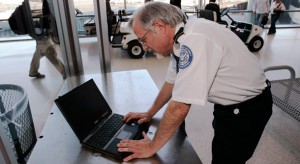Privacy Rights During International Border Searches
Many of us are familiar with the 4th amendment right to be free from unreasonable searches and seizures of property. Basically, government officials need a warrant before they can search in areas where we have a “reasonable expectation of privacy.” This includes not only our real property, but other things like our belongings and “papers,” including electronic devices.
Now, I’ve written before about warrantless searches of e-mails. Basically, the police definitely need a warrant before they can search your e-mails. However, something called the “border search exception” is creating a huge mess of border searches and privacy rights, especially with regards to electronic devices like laptops and cell phones. Basically, the “border exception” states that suspicionless border searches don’t violate American civil liberties like the 4th amendment right to privacy.
This means that the border patrol agents don’t even need reasonable suspicion to search your laptops during a border check. The idea here is that the interests of national security and anti-terrorist measures outweigh the individual’s right to privacy. Also, some argue that the “expectation of privacy” is inherently lowered at international borders.
What is the justification behind the border exception? That’s part of the big controversy surrounding border searches. The Department of Homeland Security (DHS) has issued an “Impact Assessment” on Border Searches of Electronic Devices. You can read it for yourself (it’s not a very long read), and you can find that it basically says, “Border searches don’t violate the 4th Amendment because…they don’t violate the 4th Amendment.” Not very helpful.
So what are some of the main problems regarding this issue? Here’s a breakdown of some of the issues at play:
- Warrant Requirements: Authorities need a warrant before they can search your e-mails. However, this appears to go out the window if you happen to be passing through a border with your laptop or cell phone. Again, border agents don’t even need any suspicion of criminal activity to engage in a search.
- Holding Time: DHS states that they are supposed to return your electronic equipment after a “reasonable amount of time” has been allotted for searching your stuff. However, some cases involved lengthy times like 49 days (the David Maurice House case).
- Number of Searches: Many have described the border as basically a “door for device searches.” A staggering amount of border electronic media searches have already been conducted – over 4,900 during the months of October 2012 until August 2013. That’s about 15 people a day being searched without warrants.
On the other hand, a recent 9th circuit ruling limits border searches for laptops and cell phones. This Arizona ruling held that Border Patrol agents do need at least a reasonable suspicion of criminal conduct before they can conduct a search of electronic devices. This holding only applies to the 9th circuit (i.e., the Mexico border along California and Arizona), but I see this as a proper step in the right direction. While reasonable suspicion is a much lower standard than probable cause (which requires a warrant), I agree that agents should at least need reasonable suspicion; otherwise, why are they conducting searches?
Personally, I think that while it’s true that national security concerns are important, they need to be weighed against the 4th amendment privacy rights of citizens. I think what’s happening is that the traditional discourse reserved for criminal law protections are being undermined and diluted by “national security” concerns, which have always been very difficult to define clearly. Hopefully other jurisdictions will follow Arizona’s lead and begin implementing clearer standards for border searches. Until then, you should be aware of these issues surrounding travel and privacy rights.

Comments